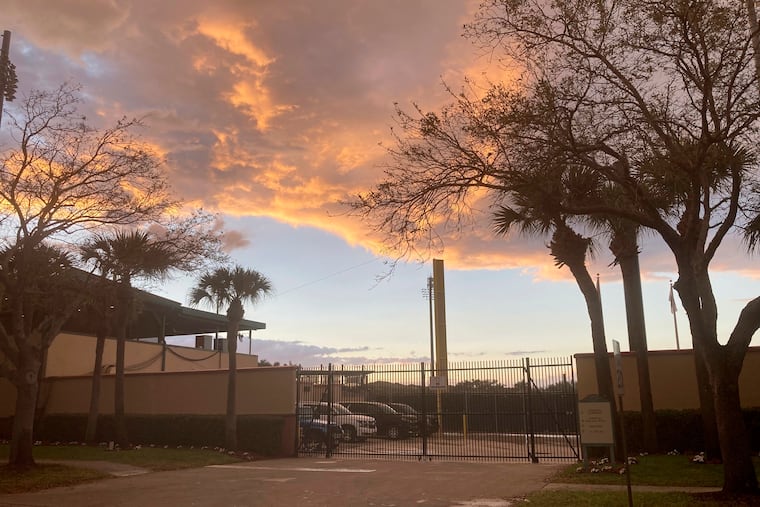Owners, players still talking but remain far apart as MLB’s Monday deadline arrives to save 162-game season
No new proposals were exchanged Sunday, but negotiators for both sides met on and off for six hours in an attempt to avoid canceling regular-season games.

After talks nearly broke down Saturday, the question entering Sunday’s collective bargaining sessions between Major League Baseball and the Players Association wasn’t whether they could reach an agreement before management’s stated Monday deadline, but rather if progress could be made to forestall the cancellation of regular-season games.
The answer, though not entirely clear, is that a Monday deal remains highly doubtful.
Details were unusually sparse Sunday night after the longest of seven consecutive days of proposal-slinging between MLB and the players’ union at a spring-training ballpark in Jupiter, Fla. An MLB spokesperson told reporters on site that the talks — which lasted roughly six hours and were limited mostly to smaller groups that didn’t include players or owners, according to sources — were “productive.” But new proposals weren’t exchanged, and multiple sources stressed that the sides remain far apart.
» READ MORE: The Phillies' Ranger Suárez as the face of the MLB labor fight
The parties agreed to meet again Monday — and at 10 a.m., earlier than the lunchtime starts that were typical of the past week. Beyond that, it’s unclear which direction negotiations will go.
MLB has set Monday as the deadline to reach an agreement for an on-time (March 31) start to the season after four weeks of spring training. A league spokesperson doubled down last week by saying missed games wouldn’t be made up. Instead, the 162-game schedule would be abridged and players wouldn’t receive their full pay.
Many players believe MLB’s deadline is a pressure tactic to get the union to cave on the canyon-sized differences that exist between the sides on most core economic issues. They assert that MLB could push back opening day, if necessary, and still shoehorn 162 games by taking less than four weeks to tune up, or playing seven-inning doubleheaders, or redrawing the schedule.
It’s also worth noting that the owners could rescind their lockout of the players, open spring training, and even begin the season, all while continuing to negotiate a collective bargaining agreement. But there has been no indication that the owners are willing to do that.
If MLB moves to cancel games, it would introduce a new set of issues to further complicate the negotiations, including how many games to play and how to compensate the players.
The players briefly considered adjourning for the weekend Saturday night after the owners essentially thumbed their noses at the union’s imperfect yet wide-ranging proposal. Whether attending the talks in person (New York Mets co-ace Max Scherzer, for instance) or receiving updates via Zoom calls, players were said to be “very upset” at the owners’ response to what they believed was a good-faith bargaining effort.
It’s highly unlikely the owners and players will be able to bridge so many yawning gaps — and philosophical chasms — in only one more day. In their Saturday proposal, the players rolled back their requests for changes to arbitration eligibility for two-year players and revenue sharing, issues that the owners have been saying from the start are non-negotiable. Unless the players drop them completely, a deal almost certainly won’t be made.
» READ MORE: Minor-league players on 40-man rosters are the untold stories of MLB’s lockout
The sides are $31 million apart this year ($51 million apart in 2026, the final year of the agreement) on the luxury-tax threshold. The owners also want to raise the tax rate on teams that surpass the threshold, a move the players contend would turn the luxury tax into a de facto salary cap.
In addition, the owners and players are $95 million apart on the concept of a bonus pool to reward pre-arbitration players based on high performance. On the minimum salary, there’s a $135,000 difference in the proposals for 2022, a divide that would grow to $215,000 by 2026.
Entering the weekend, the sides appeared to be closing in on an agreement on the parameters of a draft lottery to help combat tanking. But even that fizzled Saturday when the owners tried to make that contingent upon the players’ agreeing to expanded 14-team playoffs, the issue that is most important to the owners.
Sunday marked the 88th day since the owners directed commissioner Rob Manfred to lock out the players. The owners went 43 days without so much as a Zoom call with the players to discuss core economics, and once talks picked up in mid-January, they were sporadic, both sides taking a week and sometimes longer to issue counterproposals. Until last Monday, they met on back-to-back days only once during the lockout.
A few weeks ago, Manfred characterized missing games as “disastrous” for baseball. Now, with March beckoning and opening day 31 days away, the sides face if not a deadline then the unforgiving reality of the calendar.
» READ MORE: Phillies' Alec Bohm, and players like him, have already lost plenty because of MLB lockout